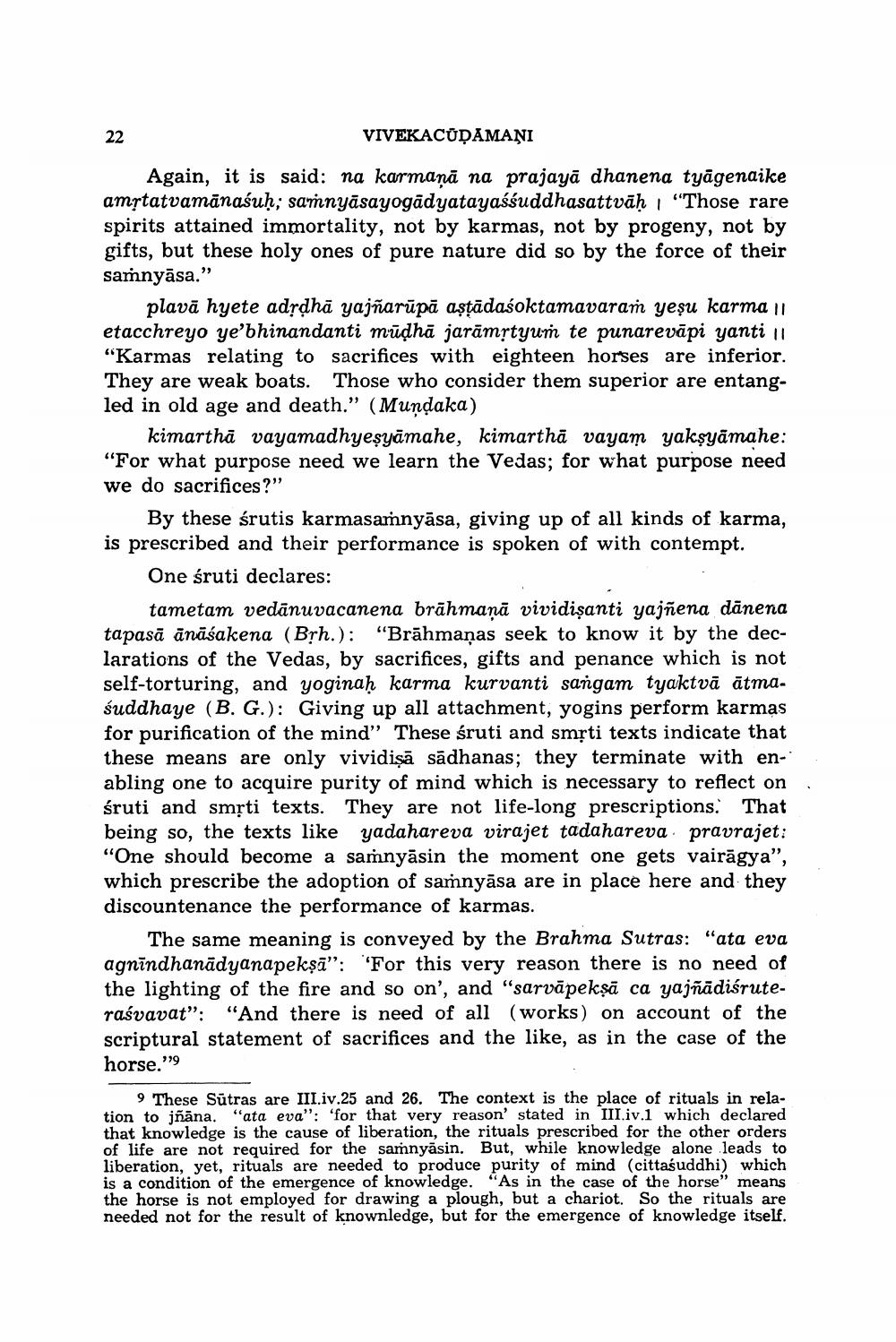________________
VIVEKACŪDAMAŅI
Again, it is said: na karmaņā na prajayā dhanena tyāgenaike amṛtatvamānasuḥ; saṁnyāsayogādyatayaśśuddhasattvaḥ | "Those rare spirits attained immortality, not by karmas, not by progeny, not by gifts, but these holy ones of pure nature did so by the force of their saṁnyāsa."
22
plava hyete adṛḍhā yajñarūpā aṣṭādaśoktamavaraṁ yeşu karma || etacchreyo ye'bhinandanti mūḍhā jarāmṛtyum te punarevāpi yanti || "Karmas relating to sacrifices with eighteen horses are inferior. They are weak boats. Those who consider them superior are entangled in old age and death." (Mundaka)
kimartha vayamadhyeṣyāmahe, kimartha vayam yakṣyamahe: "For what purpose need we learn the Vedas; for what purpose need we do sacrifices?"
By these śrutis karmasaṁnyāsa, giving up of all kinds of karma, is prescribed and their performance is spoken of with contempt. One śruti declares:
tametam vedānuvacanena brāhmaṇā vividiṣanti yajñena dānena tapasā ānāśakena (Brh.): "Brāhmaṇas seek to know it by the declarations of the Vedas, by sacrifices, gifts and penance which is not self-torturing, and yoginaḥ karma kurvanti sangam tyaktvā ātmasuddhaye (B. G.): Giving up all attachment, yogins perform karmas for purification of the mind" These śruti and smrti texts indicate that these means are only vividiṣā sadhanas; they terminate with enabling one to acquire purity of mind which is necessary to reflect on śruti and smrti texts. They are not life-long prescriptions. That being so, the texts like yadahareva virajet tadahareva pravrajet: "One should become a samnyasin the moment one gets vairāgya", which prescribe the adoption of saṁnyasa are in place here and they discountenance the performance of karmas.
The same meaning is conveyed by the Brahma Sutras: "ata eva agnindhanādyanapekṣa": 'For this very reason there is no need of the lighting of the fire and so on', and "sarvāpekṣā ca yajñādiśruterasvavat": "And there is need of all (works) on account of the scriptural statement of sacrifices and the like, as in the case of the horse."9
9 These Sūtras are III.iv.25 and 26. The context is the place of rituals in relation to jñāna. "ata eva": 'for that very reason' stated in III.iv.1 which declared that knowledge is the cause of liberation, the rituals prescribed for the other orders of life are not required for the samnyasin. But, while knowledge alone leads to liberation, yet, rituals are needed to produce purity of mind (cittaśuddhi) which is a condition of the emergence of knowledge. "As in the case of the horse" means the horse is not employed for drawing a plough, but a chariot. So the rituals are needed not for the result of knownledge, but for the emergence of knowledge itself.




